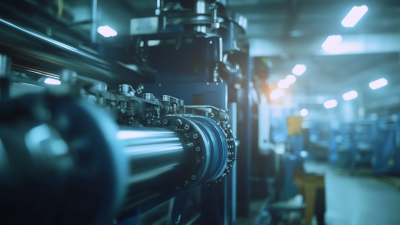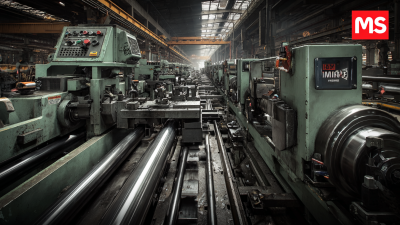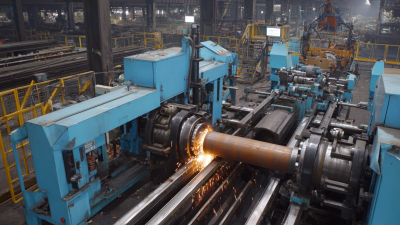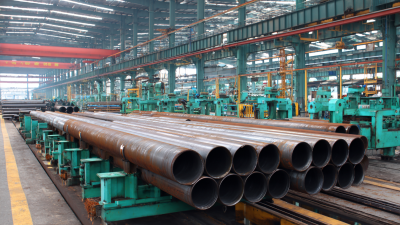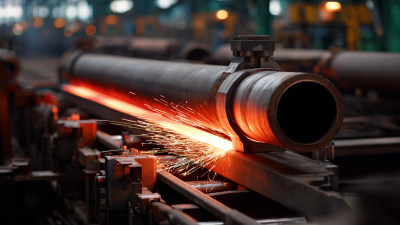
In the world of steel pipe manufacturing, the efficiency and effectiveness of production processes heavily rely on the right tools and equipment. Among these, steel pipe machinery accessories play a pivotal role, enhancing operational performance and ensuring the longevity of machinery. Understanding these essential accessories not only helps manufacturers optimize their workflows but also minimizes downtime and maintenance costs.

In this guide, we will delve into seven critical steel pipe machinery accessories that every operator should be familiar with, covering their functionalities and benefits. Whether you're a seasoned professional or just starting in the industry, this comprehensive overview will equip you with the knowledge necessary to make informed decisions about your steel pipe operations.
In the modern manufacturing landscape, steel pipe machinery accessories play a pivotal role in enhancing operational efficiency. According to a report by the International Association of Iron and Steel Manufacturers, the global steel pipe market is projected to grow at a CAGR of 5.1% through 2025. This growth underscores the need for advanced machinery and accessories that optimize production processes. Accessories such as precision cutting tools, automated welding machines, and advanced handling equipment not only boost productivity but also ensure higher quality outcomes. For instance, the implementation of automatic pipe handling systems can reduce labor costs by up to 30% while increasing throughput rates.
Furthermore, integrating advanced technology into steel pipe machinery accessories can enhance the overall sustainability of manufacturing practices. A recent study by the World Steel Association revealed that modernizing equipment can lead to a 20% reduction in energy consumption. Accessories that facilitate better waste management and recycle materials efficiently contribute to a greener manufacturing process. As companies strive to meet sustainability goals, the role of innovative machinery accessories becomes increasingly crucial in maintaining competitiveness and compliance with environmental standards.
When selecting steel pipe machinery accessories, it is essential to focus on key performance indicators (KPIs) that can significantly impact production efficiency and product quality. According to a recent report by the International Steel Association, manufacturers that prioritize equipment compatibility and operational reliability can see a 20-30% increase in overall productivity. This highlights the importance of choosing accessories that not only fit well with existing machinery but also withstand the rigors of continuous operation.

Additionally, durability is a crucial KPI, with studies indicating that high-quality steel pipe accessories can extend the lifespan of machinery by up to 40%. This is particularly relevant in industries where downtime can cost businesses thousands of dollars per hour. For instance, investing in corrosion-resistant components can reduce maintenance costs and enhance operational continuity, making it vital for stakeholders to evaluate materials and manufacturing processes carefully. By focusing on these indicators, companies can make informed decisions that optimize their machinery's performance and longevity.
The landscape of steel pipe manufacturing is rapidly evolving, driven by the integration of innovative technologies and advanced machinery accessories. As the industry embraces change, manufacturers are looking to enhance productivity, reduce waste, and improve quality through the implementation of cutting-edge equipment. Some pivotal trends include the adoption of automated processes, which minimize manual intervention and elevate precision in pipe production. These advancements not only streamline operations but also significantly enhance safety protocols within manufacturing environments.
When considering the right accessories for your machinery, it’s essential to keep an eye on the specific needs of your operation. Investing in smart sensors can provide real-time data on production metrics, enabling proactive adjustments to maintain high efficiency. Moreover, utilizing integrated software systems can simplify the workflow, ensuring that all machinery operates harmoniously. As the industry leans toward sustainability, focus on accessories that enhance energy efficiency, further benefiting both the environment and your bottom line.
For companies looking to remain competitive, understanding current trends can create opportunities for growth. Keep abreast of developments in IoT and AI technologies that are reshaping the manufacturing landscape. Embracing these innovations not only positions your business at the forefront of the industry but also drives long-term success in steel pipe manufacturing.
| Accessory Name | Function | Material | Innovation Trend | Integration Technology |
|---|---|---|---|---|
| Pipe Cutting Machine | Cuts steel pipes to desired lengths | Carbon Steel | Automatic Feed Systems | CAD/CAM Integration |
| Bending Machine | Bends pipes into specified shapes | Stainless Steel | Programmable Bending Options | Sensors for Precision Control |
| Welding Machine | Joins metal pipes together | Mild Steel | Laser Technology | Artificial Intelligence Monitoring |
| Pipe Threading Machine | Creates threads on the pipe ends | Alloy Steel | Enhanced Speed Features | Automated Lubrication Systems |
| Pipe Testing Machine | Tests pipe integrity | High-Strength Steel | Non-Destructive Testing | Data Analytics Capabilities |
| Pipe Cleaning System | Cleans pipes before inspection | Plastic Composites | Eco-Friendly Solutions | Automated Control Systems |
| Pipe Stamping Machine | Marks pipes with essential information | Steel Alloys | Digital Printing Technology | Integration with ERP Systems |
Investing in quality steel pipe machinery accessories can significantly impact the operational efficiency and longevity of equipment. When performing a cost-benefit analysis, it becomes evident that while high-quality accessories may come with a higher upfront cost, the long-term savings and benefits they provide can outweigh these initial expenses. These accessories often lead to fewer breakdowns and reduced maintenance costs, resulting in less downtime. Over time, companies can save thousands of dollars by avoiding frequent repairs and replacements associated with inferior products.
Moreover, quality accessories enhance the overall performance of machinery, which can improve production output. This increase not only boosts profitability but also allows businesses to maintain competitiveness in a demanding market. Investing in superior steel pipe machinery accessories ensures that operations run smoothly and efficiently, thus maximizing return on investment. Ultimately, the analysis shows that the right accessories do not merely represent an expense but rather a strategic investment for sustainable growth and operational excellence.

When working with steel pipe machinery accessories, ensuring safety and compliance with industry standards is paramount. Industrial settings tend to involve complex operations with heavy equipment, which means that adhering to safety protocols can significantly reduce the risks of accidents and injuries. Understanding the specific safety standards associated with each machinery accessory, such as those set by OSHA or ANSI, is essential for any organization aiming to create a safe working environment. Regular training for employees on these standards not only fosters a culture of safety but also ensures that everyone is knowledgeable about the potential hazards associated with their equipment.
Moreover, compliance with safety standards goes beyond just training; it also encompasses regular maintenance and inspections of machinery accessories. Equipment like clamps, fittings, and connectors must meet rigorous specifications to function safely under operational conditions. Businesses must keep accurate records of compliance checks and repairs, as this documentation can be crucial in case of inspections or audits. By prioritizing safety standards and compliance, companies not only protect their employees but also enhance their operational efficiency and reputation in the industry.
